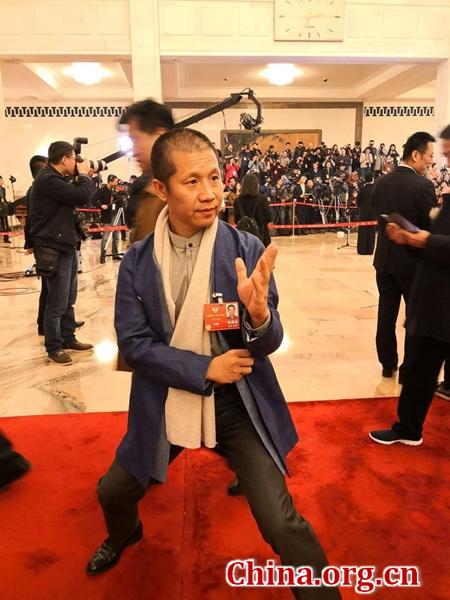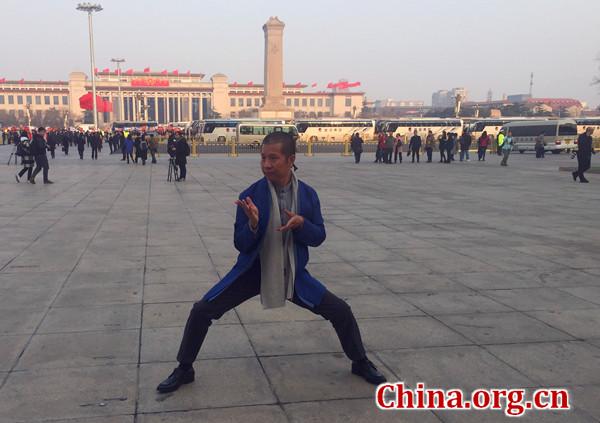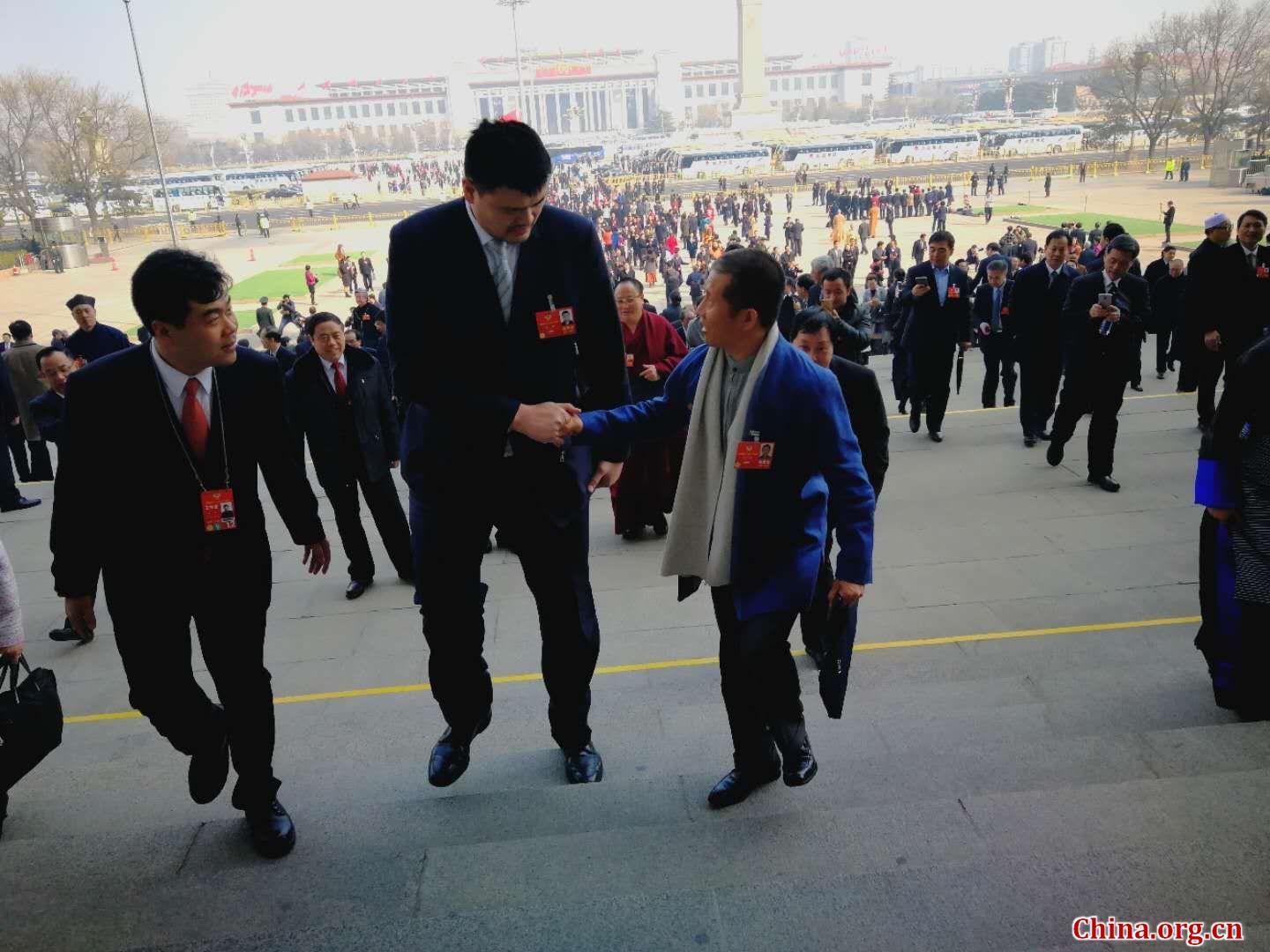Tai chi master proposes academy and worldwide institutes
- By Zhang Rui
 0 Comment(s)
0 Comment(s) Print
Print E-mail China.org.cn, March 26, 2018
E-mail China.org.cn, March 26, 2018

An overseas master of martial arts has appealed to establish a tai chi academy and institutes around the world to teach and promote the ancient Chinese practice and philosophy, which enjoys wide popularity as a wellness exercise among Chinese people today.
Hong Weiguo, the New Zealand-based kung fu master and one of 35 overseas Chinese invited to attend the first session of the 13th National Committee of the Chinese People's Political Consultative Conference (CPPCC) in Beijing, performed tai chi boxing spontaneously in front of the Great Hall of the People following a plenary meeting during the assembly of China's top political advisors from March 3-15.
"I did that because I was thrilled to attend the event, a supreme summit of advisors," Hong told China.org.cn in a recent interview, "and I wanted to demonstrate tai chi at this special event and get everybody there to enjoy and know tai chi."

China's top advisory body has invited overseas Chinese from around the world to its annual national session every year since 2001, as a means to let Chinese living abroad understand more about China's political systems and also encourage them to make contributions or proposals to China as a nation, or to their ancestral hometowns. This year, 35 delegates from 25 countries were invited and Hong was one of them. Unlike CPPCC members who serve a 5-year term, overseas delegates receive the opportunity to attend the national meeting just one time.
"Although I would only have the privilege to attend the national meeting once, I felt this would be a lifetime honor and responsibility for me. And I felt very proud of the strong and prosperous motherland," he said.
The master was applauded at the CPPCC session, and one photo even showed him talking congenially with Yao Ming, the former national basketball icon, president of the Chinese Basketball Association and a CPPCC member.
"Yao loves tai chi," Hong said. "He told me he studied it when he was in Houston."
Hong is the adopted grandson of Hong Junsheng, the late founder of Hong-style tai chi. In the 1990s, he originally wanted to become a kung fu star as he studied a martial arts style from the Shaolin Temple in his youth, but his dream was cut short when he seriously injured his leg during college. After years of recovery and searching for help, master Hong Junsheng suggested tai chi, which eventually cured him.
"Mr. Hong Junsheng is my teacher, my master, my mentor and my guru... I don't have words to describe how important he was to me," said Hong, noting that he learned not only the form, but also the life philosophy from master Hong Junsheng. It was his master's last wish which inspired him to become an ambassador of tai chi, to strive to contribute to good health around the globe.
Hong went to New Zealand in 1999 with a dream to promote Chinese tai chi and received a green card in 2006 for his tai chi expertise. After retiring from business in 2012, he became a tai chi teacher, working with local communities and schools, as well as at China's Confucius Institute in New Zealand, performing and teaching the practice for free. Each year, Hong spends half of his time on the road, travelling to dozens of countries to speak about and teach tai chi. His disciples and followers are scattered across the globe.
"I knew currently there are 300 million to 400 million people around the world learning and practicing tai chi—the boxing style which is a symbol of China, like India's Yoga," he said. "President Xi Jinping has stressed confidence in Chinese culture many times, and I think tai chi is one of the national treasures that can enhance confidence and promote Chinese culture."
"I always tell people, 'Tai chi is originally from China, but belongs to the world,'" he said. "Tai chi is beautiful. It can convey health, harmony and peace. It is a universal body language. If anyone becomes interested in it and start to appreciate it, they will then come to study Chinese language and culture, which is very good for the promotion of Chinese culture. It will not force or persuade anyone to learn Chinese, but invite more people in naturally with its own beauty."
The master brought one proposal to the CPPCC session this year, asking to speed up the process of applying to UNESCO to include tai chi on the intangible cultural heritage list. "What a pity that tai chi has not yet been recognized by UNESCO after a decade-long effort. It is a great vehicle of essential Chinese culture, body exercise and philosophy originating from Taoism," said Hong. He expressed his hope that more people can understand the importance and urgency of securing the status of tai chi in the world, as well as his hope that the relevant government departments in China will consider forming a tai chi academy.

In Hong's vision, the tai chi academy will not be solely about physical education, but also about its cultural connotations. The academy will study and promote tai chi, and also take on related studies of ancient Chinese civilization, traditional Chinese medicine and more.
The martial art, he explained, will cultivate people's body and mind and help them walk on the right path. "When you have a right heart and mind, you will have positive power to build a better society."
He believes there are significant markets for tai chi overseas, especially with China proposing the Belt and Road Initiative among dozens of countries. "But we still need more real inheritors, promoters and teachers of tai chi outside of China," he stressed. "If the central government can allocate more money and efforts, the tai chi academy and institutes will be able to operate in parallel with the Confucius Institutes in the future—one for Chinese cultural teaching and studies, and one for physical education and martial arts philosophy."
As to the reported doubts about the Confucius Institutes and about the potential future of the tai chi institutes coming from some people in foreign countries in recent years, Hong Weiguo only smiled. "This is also right for tai chi philosophy. Everything has two sides, and people will always have something to say, good or bad. You should just move on and do your right things."






Go to Forum >>0 Comment(s)